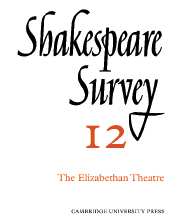Book contents
- Frontmatter
- The Open Stage: Elizabethan or Existentialist?
- The Lantern of Taste
- Was there a Typical Elizabethan Stage?
- On Reconstructing a Practicable Elizabethan Public Playhouse
- The Discovery-space in Shakespeare’s Globe
- ‘Passing over the Stage’
- The Actor at the Foot of Shakespeare’s Platform
- Elizabethan Stage-Practice and the Transmutation of Source Material by the Dramatists
- The Maddermarket Theatre and the Playing of Shakespeare
- Actors and Scholars: A View of Shakespeare in the Modern Theatre
- Cleopatra as Isis
- Shakespeare’s Friends: Hathaways and Burmans at Shottery
- Illustrations of Social Life II: A Butcher and some Social Pests
- International Notes
- Shakespeare Productions in the United Kingdom: 1957
- The Whirligig of Time, A Review of Recent Productions
- The Year's Contributions to Shakespearian Study 1 Critical Studies
- 2 Shakespeare’s Life, Times and Stage
- 3 Textual Studies
- Books Received
- Index
- Plate Section
The Whirligig of Time, A Review of Recent Productions
Published online by Cambridge University Press: 28 March 2007
- Frontmatter
- The Open Stage: Elizabethan or Existentialist?
- The Lantern of Taste
- Was there a Typical Elizabethan Stage?
- On Reconstructing a Practicable Elizabethan Public Playhouse
- The Discovery-space in Shakespeare’s Globe
- ‘Passing over the Stage’
- The Actor at the Foot of Shakespeare’s Platform
- Elizabethan Stage-Practice and the Transmutation of Source Material by the Dramatists
- The Maddermarket Theatre and the Playing of Shakespeare
- Actors and Scholars: A View of Shakespeare in the Modern Theatre
- Cleopatra as Isis
- Shakespeare’s Friends: Hathaways and Burmans at Shottery
- Illustrations of Social Life II: A Butcher and some Social Pests
- International Notes
- Shakespeare Productions in the United Kingdom: 1957
- The Whirligig of Time, A Review of Recent Productions
- The Year's Contributions to Shakespearian Study 1 Critical Studies
- 2 Shakespeare’s Life, Times and Stage
- 3 Textual Studies
- Books Received
- Index
- Plate Section
Summary
It took the Old Vic nine years up to 1923 to stage all Shakespeare’s plays. To produce all the Folio plays in the five seasons 1953–8 was a strenuous undertaking. Nine plays remained for the final season, reduced to eight productions by combining the first two Parts of Henry VI, but standards inevitably suffered. Nevertheless, the five-year plan had drawn one-and-a-quarter million people to Shakespeare, there had been a successful visit to New York and, later in 1958, the Old Vic Company was to set out on a six-months tour of North America. The Waterloo Road stage was then to be freed from Shakespeare’s monopoly, though it remains to be seen whether Schiller and others will draw sufficient audiences.
As remarked in last year's article, the order of the five-year plan was haphazard, but at least it concluded with a production of Henry VIII which brought back Dame Edith Evans to the Old Vic after ten years' absence and Sir John Gielgud after eighteen. The Shakespearian authorship of Henry VIII has long been under suspicion. It has been banished from the company of the Histories.1 It has been burlesqued, to the extent of tossing the royal infant into the audience to bring down the curtain on a storm of cheers and cries of rage. It has come in useful to compliment three modern monarchs on their coronations. It is generally regarded as an episodic and uneven play, to be supported by elaborate stage spectacle and star performers who will make something of its two or three good scenes.
- Type
- Chapter
- Information
- Shakespeare Survey , pp. 122 - 130Publisher: Cambridge University PressPrint publication year: 1959

